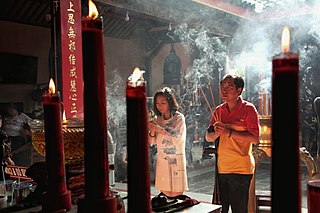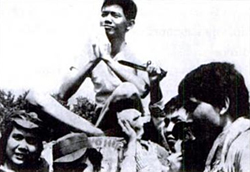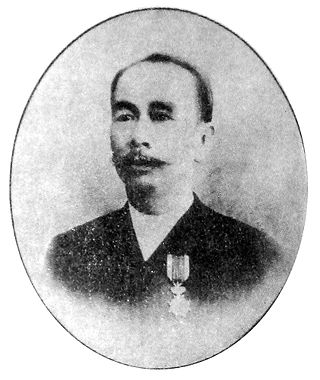Related Research Articles

Chinese Indonesians, colloquially Cindo, Chindo or simply Orang Tionghoa or Tionghoa are Indonesians whose ancestors arrived from China at some stage in the last eight centuries. Chinese Indonesians are the fourth largest community of Overseas Chinese in the world after Thailand, Malaysia, and the United States.
Indonesian philosophy is a generic designation for the tradition of abstract speculation held by the people who inhabit the region now known as Indonesia. Indonesian philosophy is expressed in the living languages found in Indonesia and its national language Indonesian, comprising many diverse schools of thought with influences from Eastern and Western origins, and indigenous philosophical themes.

Soe Hok Gie was a Chinese Indonesian activist who opposed the successive dictatorships of Presidents Sukarno and Suharto.
Arief Budiman, born Soe Hok Djin was a Chinese Indonesian sociologist, cultural critic, and social activist.
Marga Tjoa was an Indonesian popular romance and children's literature writer better known by the pen name Marga T. One of Indonesia's most prolific writers, she first became well known in 1971 for her serial Karmila which was published as a book in 1973 and later made into a film. As of 2006, she had published 38 novels.

Totok is an Indonesian term of Javanese origin, used in Indonesia to refer to recent migrants of Arab, Chinese or European origins. In the eighteenth and nineteenth centuries it was popularised among colonists in Batavia, who initially coined the term to describe the foreign born and new immigrants of "pure blood" – as opposed to people of mixed indigenous and foreign descent, such as the Peranakan Arabs, Chinese or Europeans.
George William Skinner was an American anthropologist and scholar of China. Skinner was a proponent of the spatial approach to Chinese history, as explained in his Presidential Address to the Association for Asian Studies in 1984. He often referred to his approach as "regional analysis," and taught the use of maps as a key class of data in ethnography.
Leo Suryadinata, is an Indonesian sinologist.

November 1828 is a 1979 Indonesian historical drama directed by Teguh Karya. Production cost an estimated Rp 240 million, making it the most expensive Indonesian movie up to that point. It tells the story of a village struggling against the Dutch colonial military during the Java War, and touches on the themes of nationalism and cultural identity. The movie won 6 Citra Awards.

? is a 2011 Indonesian drama film directed by Hanung Bramantyo. It stars Revalina Sayuthi Temat, Reza Rahadian, Agus Kuncoro, Endhita, Rio Dewanto, and Hengky Sulaeman. The film focuses around Indonesia's religious pluralism, which often results in conflict between different beliefs, represented in a plot that revolves around the interactions of three families, one Buddhist, one Muslim, and one Catholic. After undergoing numerous hardships and the deaths of several family members in religious violence, they are reconciled.
Maria Ulfah Soebadio Sastrosatomo, better known by her first married name Maria Ulfah Santoso, was an Indonesian politician and women's rights activist who served as Minister of Social Affairs under Prime Minister Sutan Sjahrir. She was the first Indonesian woman to receive a degree in law as well as the first female Indonesian cabinet member. Santoso, the daughter of a politician, became interested in women's rights after seeing numerous injustices in her youth. Despite pressure to become a doctor, she graduated with a degree in law from Leiden University in 1933; while in the Netherlands she also became involved in the Indonesian nationalist movement.
Ahmad Salim, better known by his birth name Wim Umboh but also known by the Chinese name Liem Yan Yung, was an Indonesian director who is best known for his melodramatic romances.
Mira Widjaja (Wong), or Mira W., is a highly popular Indonesian author. In spite of her background being an ethnic Chinese of Cantonese extraction from the Peranakan Chinese diaspora community, her work now reaches audiences from the entire country. Her father, Othniel, was among the pioneers of the Indonesian movie industry. She writes in an accessible genre, and deals with topics such as romance, crime and hospital life. She was a medical doctor before establishing herself as a writer.

Fifi Young was an Indonesian actress of mixed French and Chinese descent who acted in at least 86 films over her 34-year career.

Njoo Cheong Seng was a Chinese-Indonesian playwright and film director. Also known by the pen name Monsieur d'Amour, he wrote more than 200 short stories, novels, poems and stage plays during his career; he is also recorded as directing and/or writing eleven films. He married four times during his life and spent several years travelling throughout Southeast Asia and India with different theatre troupes. His stage plays are credited with revitalising theatre in the Indies.

Lie Kim Hok was a peranakan Chinese teacher, writer, and social worker active in the Dutch East Indies and styled the "father of Chinese Malay literature". Born in Buitenzorg, West Java, Lie received his formal education in missionary schools and by the 1870s was fluent in Sundanese, vernacular Malay, and Dutch, though he was unable to understand Chinese. In the mid-1870s he married and began working as the editor of two periodicals published by his teacher and mentor D. J. van der Linden. Lie left the position in 1880. His wife died the following year. Lie published his first books, including the critically acclaimed syair (poem) Sair Tjerita Siti Akbari and grammar book Malajoe Batawi, in 1884. When van der Linden died the following year, Lie purchased the printing press and opened his own company.

Tio Ie Soei was a peranakan Chinese writer and journalist active in the Dutch East Indies and Indonesia. Born in the capital at Batavia, Tio entered journalism while still a teenager. By 1911 he had begun writing fiction, publishing Sie Po Giok – his first novel – that year. Over the next 50 years Tio wrote extensively in several newspapers and magazines, serving as an editor for some. He also wrote several novels and biographies, including ones on Tan Sie Tat and Lie Kim Hok.

Phoa Keng Hek Sia was a Chinese Indonesian Landheer (landlord), social activist and founding president of Tiong Hoa Hwe Koan, an influential Confucian educational and social organisation meant to better the position of ethnic Chinese in the Dutch East Indies. He was also one of the founders of Institut Teknologi Bandung.

Mr. Tjung Tin Jan or Jani Arsadjaja was an Indonesian politician and lawyer of Chinese Indonesian origin.
James Danandjaja, born Tan Soe Lien was an Indonesian anthropologist known as the foremost scholar on Indonesian folklore. He was a professor of anthropology at the University of Indonesia for nearly twenty years, establishing the field of Indonesian folkloristics. He studied under the eminent anthropologist Koentjaraningrat and renowned folklorist Alan Dundes.
References
- Suryadinata, Leo (1995), Prominent Indonesian Chinese: Biographical Sketches (3rd ed.), Singapore: Institute of Southeast Asian Studies, ISBN 978-981-3055-04-9.
- Tan, Mely G. (2008), Etnis Tionghoa di Indonesia: Kumpulan Tulisan [Ethnic Chinese in Indonesia: A Collection of Writings], Jakarta: Yayasan Obor Indonesia, ISBN 978-979-461-689-5.